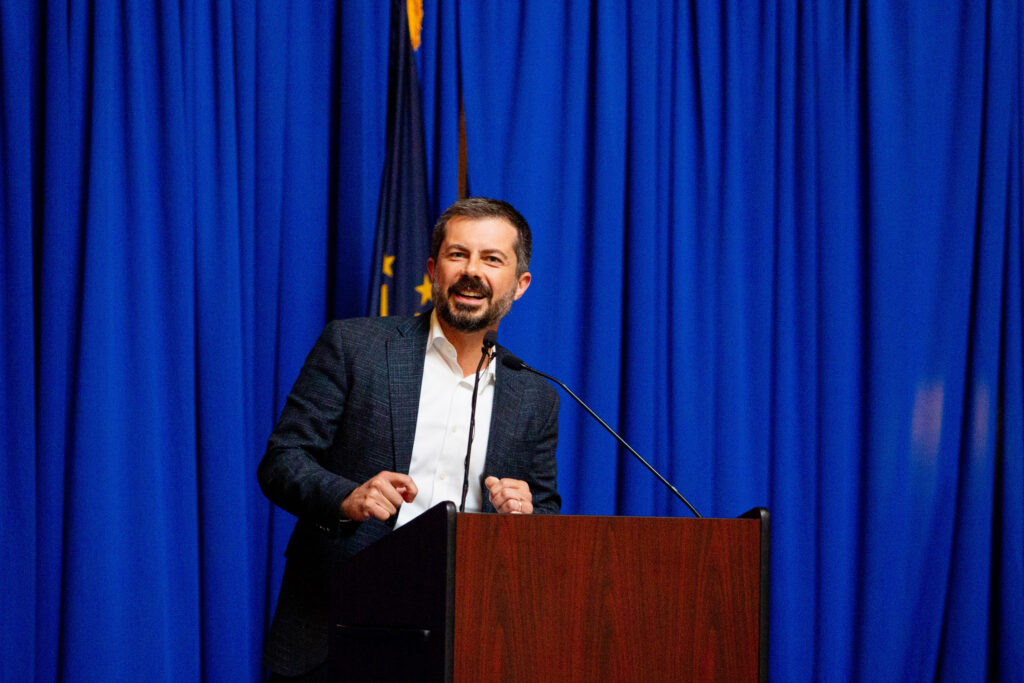Pete Buttigieg draws excited crowd to sold-out SU speaker event
Pete Buttigieg draws sold-out crowd for SU talk
The former U.S. Transportation Secretary discussed leadership, sustainability and the country’s political landscape amid the current federal government shutdown.

When Syracuse University sent out an email announcing former U.S. Transportation Secretary Pete Buttigieg would be speaking on campus, Will Clifford was shopping at Target.
“I dropped everything I was doing,” said Clifford, a journalism freshman. “As soon as I saw the notification he was speaking, I quickly bought tickets.”
Clifford made the right call there in Target as tickets for Buttigieg’s free talk Friday in the National Veterans Resource Center’s 750-seat K.G. Tan Auditorium were scooped up in less than 30 minutes.
Co-hosted by the Maxwell School of Citizenship and Public Affairs and the Whitman School of Management, Buttigieg’s talk consisted of answering questions from Jay Golden, the Pontarelli professor of environmental sustainability and finance, and a handful of pre-selected students.
A former two-term Democratic mayor of South Bend, Indiana and Transportation Secretary for President Biden, Buttigieg began by speaking about the current state of the nation. During the midst of a federal government shutdown, Buttigieg didn’t underplay his concerns.
“I don’t think it’s an exaggeration to say that not since the Civil War has our country faced this level of challenge,” Buttigieg said. “So much of it is actually happening, not because of an external threat, but things that are happening within us, within the American people.”
Buttigieg criticized the presidential administration for what he considered severe overreach.
“Law, academia, late-night television,” he said. “There’s nothing that’s outside of the scope of what the current government seeks to control.”
Buttigieg didn’t hesitate to bring up flaws he sees in his own party, such as a strategic failure in messaging that’s caused a lack of popular support among Democrats.
“I think the biggest problem the Democratic Party faces is the risk of appearing to be about reproducing the status quo,” Buttigieg said. “If the status quo was working … we wouldn’t be here.”
Buttigieg said his party must focus on a new vision for replacing many of the programs that the Trump administration had effectively destroyed, as opposed to attempting to “find all the pieces that they snatched and tape them back together the way they used to be.”
Journalism freshman Zac Ventola said he found that concept particularly thought-provoking.
“Rebuilding in a different way … that’s not something that I ever really thought about, but that resonated with me,” Ventola said. “It’s true that people haven’t cared for how Democrats have run the country, and it’s not going to be a successful time in office for them if they rebuild everything exactly how it was before.”
The political strategy conversation wasn’t the only part of the event Ventola enjoyed. He said it was a special experience to hear Buttigieg speak.
“Just listening to him talk is so easy because of how good a speaker he is,” said Ventola. “He’s so concise and clear in all of his beliefs, and that’s something that I can really respect.”
Later in the Q&A, Buttigieg discussed issues surrounding the lack of commitment to tackle climate change and the need for increased bipartisan collaboration.
Clifford said he wished Buttigieg had dived deeper into these specific topics.
“I felt like there were some areas where he addressed a problem that was notable, but didn’t kind of bring up a solution,” Clifford said.
Clifford said he particularly wanted Buttigieg to expand on the idea of working together as a nation.
“He didn’t really talk about how to foster discourse and to actually speak with somebody else who has a different idea than you,” Clifford said.
Buttigieg ended the hour-long talk by urging students to be more civically involved.
“Often there’s a city council proceeding or a state legislative committee meeting where you can just show up. So do it.”
